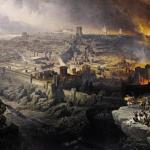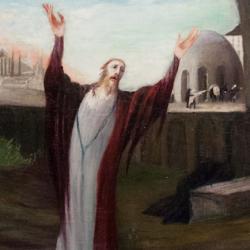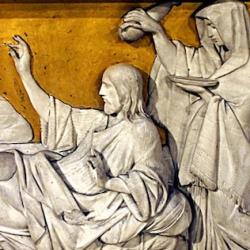John the Baptist is like a sacrificial victim, a Passover lamb, innocently slaughtered (Matthew 14). In the next periscope, Jesus performs a food miracle, the first such miracle in Matthew. It is a Passover meal, as well as manna in the wilderness.
Following the meal, Jesus’ disciples get into a boat to cross the sea, but begin to founder. They are “afflicted,” a word that connotes “torture,” but Jesus appears and brings them to safety. This is clearly an Exodus story. Jesus comes in the “fourth watch of the night,” that is, in Roman time reckoning, toward daybreak (v. 25), just as Yahweh confused Pharaoh’s chariots and divided the sea in front of Israel in the “morning watch” (Exod 14:24). While the disciples struggle with the waves, Jesus is on a mountain, alone, as Moses went to the mountain alone to pray.
Jesus reinforces the exodus theme by His words: When He appears on the sea, He assures His disciples with “it is I” (v. 27). Several times in Isaiah’s “new exodus” section, the Lord assures Israel that they will survive the judgments to come by saying “It is I” (Isa 41:4; 43:10). The sentence is a variation on Yahweh, the name revealed to Moses on Sinai. Yahweh is the one who is with Israel, the I am.
In short, as Jesus-Elisha begins to shape His disciples in the core of a new Israel, given Israel’s rejection, He leads them through a Passover and Exodus.
The Old Testament teaches that Yahweh and Yahweh alone has power over the sea. Especially to a land-based people like Israel, the sea is threatening and tumultuous. The sea represents the surging flood of Gentiles that needs to be held back from the land. Israel depended on Yahweh to do the holding back. And so we have numerous passages in the Old Testament that speak of Yahweh striding on the sea, walking on the sea as if it were land (Job 9:8; Psa 77:19; 107:23-30; Isa 43:19; Hab 3:16).
Jesus is Yahweh in human flesh, with the same power over the waves, the same authority to walk on the sea and to calm them, the same power to save those who are drowning.
For the first time, Peter takes a lead role in a story about Jesus. He becomes the leading apostle, representative and spokesman for the rest. As Jesus is presented as the new Elisha, Peter is often presented as a Gehazi, the ambiguous servant of Elisha.
Some think Peter is presumptuous for jumping out of the boat before Jesus got there. His doubt, it’s said, is the doubt that Jesus will reach them in time. I don’t think so. Peter can walk on the sea. He doesn’t get very far, and he is frightened by the waves and storm, but for a few moments He shares in Jesus’ mastery of the sea. Even though he has only a “little faith,” Peter is capable of doing what Jesus did, of moving mountains and tossing them into the sea. What will happen when his faith grows? Look at Acts, and you’ll know the rest of the story.
The episode shows us what we can expect when we climb into the boat of the church. As we follow the orders of Jesus and push off from shore, we’ll face storms and Jesus won’t be there (or won’t appear to be there) to help. We will have to endure the challenges of following Jesus without Him, as Adam faced the serpent without the Creator. But the storms will be calmed when Jesus arrives. In the meantime, there is nothing to fear. Jesus is master of the wind and waves, and He can calm the storm with a word. He is that “manner of man,” the Son of God.
And not only that: We can expect to share in the power of Jesus. Jesus is God’s only Son, and He can walk on the waves because He is God. He can calm the sea because He created the sea. But Peter gives us a foretaste of what we can expect – that by faith in Jesus’ power, we share in Jesus’ power, and we will stride the waves just as He does.












